Jeep Compass VS Renault Master Bus – Specs, Efficiency & Price Comparison
Which model is the better choice – the Jeep Compass or the Renault Master Bus? We compare performance (240 HP vs 180 HP), boot capacity (438 L vs ), efficiency (2 L vs 8.70 L), and of course, the price (34200 £ vs 36600 £).
Find out now which car fits your needs better!
The Jeep Compass (SUV) is powered by a Petrol MHEV or Plugin Hybrid engine and comes with a Automatic transmission. In comparison, the Renault Master Bus (Bus) features a Diesel engine and a Manuel or Automatic gearbox.
When it comes to boot capacity, the Jeep Compass offers 438 L, while the Renault Master Bus provides – depending on what matters most to you. If you’re looking for more power, you’ll need to decide whether the 240 HP of the Jeep Compass or the 180 HP of the Renault Master Bus suits your needs better.
There are also differences in efficiency: 2 L vs 8.70 L. In terms of price, the Jeep Compass starts at 34200 £, while the Renault Master Bus is available from 36600 £.
Compare all the key specs now and find out which model fits your lifestyle best!
Jeep Compass
The Jeep Compass combines a rugged aesthetic with modern sophistication, making it a standout choice in the compact SUV segment. Its robust design is complemented by a comfortable interior that offers ample space and cutting-edge technology for a seamless driving experience. Whether tackling urban environments or venturing off-road, the Compass provides versatility and reliability, embodying the adventurous spirit synonymous with the Jeep brand.
details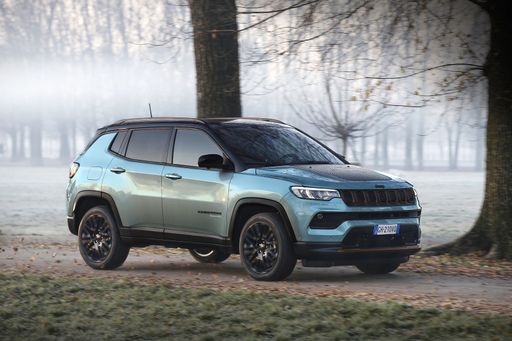 @ media.stellantis.com
@ media.stellantis.com
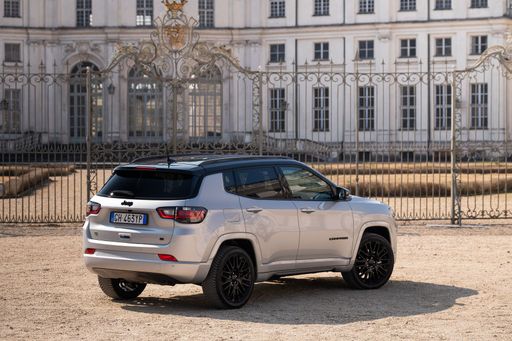 @ media.stellantis.com
@ media.stellantis.com
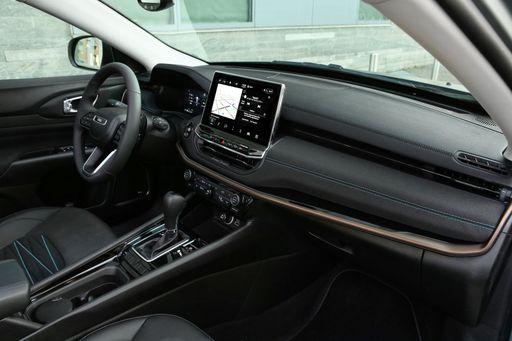 @ media.stellantis.com
@ media.stellantis.com
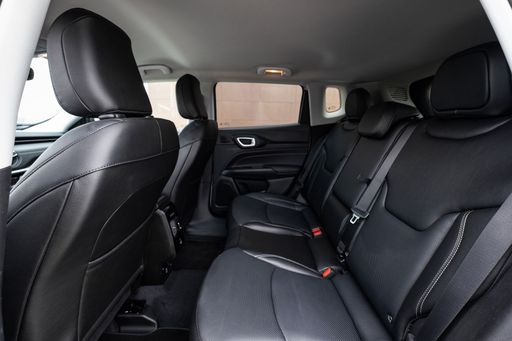 @ media.stellantis.com
@ media.stellantis.com
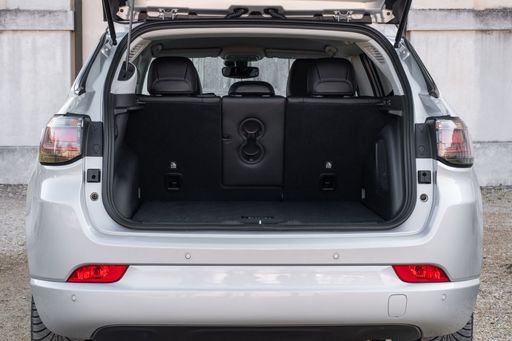 @ media.stellantis.com
@ media.stellantis.com
Renault Master Bus
The Renault Master Bus offers a spacious and flexible interior, making it an excellent choice for transporting groups comfortably. It features a robust design and advanced safety systems, ensuring a secure ride for all passengers. With its efficient diesel engine, the Master Bus combines power with impressive fuel economy, appealing to both businesses and private users alike.
details

|
|
|
|
|
Costs and Consumption |
|
|---|---|
|
Price
34200 - 46900 £
|
Price
36600 - 43200 £
|
|
Consumption L/100km
2 - 5.5 L
|
Consumption L/100km
8.7 - 10.7 L
|
|
Consumption kWh/100km
-
|
Consumption kWh/100km
-
|
|
Electric Range
36 km
|
Electric Range
-
|
|
Battery Capacity
-
|
Battery Capacity
-
|
|
co2
47 - 124 g/km
|
co2
227 - 280 g/km
|
|
Fuel tank capacity
36 - 55 L
|
Fuel tank capacity
105 L
|
Dimensions and Body |
|
|---|---|
|
Body Type
SUV
|
Body Type
Bus
|
|
Seats
5
|
Seats
6 - 9
|
|
Doors
5
|
Doors
4
|
|
Curb weight
1575 - 1935 kg
|
Curb weight
2189 - 2361 kg
|
|
Trunk capacity
420 - 438 L
|
Trunk capacity
-
|
|
Length
4404 mm
|
Length
5075 - 5575 mm
|
|
Width
1819 mm
|
Width
2070 mm
|
|
Height
1629 - 1649 mm
|
Height
2290 - 2486 mm
|
|
Payload
465 - 470 kg
|
Payload
939 - 1254 kg
|
Engine and Performance |
|
|---|---|
|
Engine Type
Petrol MHEV, Plugin Hybrid
|
Engine Type
Diesel
|
|
Transmission
Automatic
|
Transmission
Manuel, Automatic
|
|
Transmission Detail
Automat. Schaltgetriebe (Doppelkupplung), Automatikgetriebe
|
Transmission Detail
Manual Gearbox, Automated Manual
|
|
Drive Type
Front-Wheel Drive, All-Wheel Drive
|
Drive Type
Front-Wheel Drive
|
|
Power HP
130 - 240 HP
|
Power HP
135 - 180 HP
|
|
Acceleration 0-100km/h
7.3 - 10 s
|
Acceleration 0-100km/h
-
|
|
Max Speed
183 - 200 km/h
|
Max Speed
150 - 165 km/h
|
|
Torque
240 Nm
|
Torque
360 - 400 Nm
|
|
Number of Cylinders
4
|
Number of Cylinders
4
|
|
Power kW
96 - 177 kW
|
Power kW
99 - 132 kW
|
|
Engine capacity
1332 - 1469 cm3
|
Engine capacity
2299 cm3
|
General |
|
|---|---|
|
Model Year
2024
|
Model Year
2023
|
|
CO2 Efficiency Class
D, B
|
CO2 Efficiency Class
G
|
|
Brand
Jeep
|
Brand
Renault
|
Jeep Compass
Exploring the Jeep Compass: A Modern SUV with Innovative Features
The Jeep Compass continues to challenge the boundaries of what an SUV can be, offering a blend of practicality, efficiency, and rugged appeal. This model, distinguished by its diverse range of powertrains, promises to cater to various needs and preferences. From urban commuting to exploring off-road trails, the Compass delivers with aplomb.
Engine Versatility and Performance
Under the bonnet, the Jeep Compass offers a diverse lineup of engines designed to meet varying driver demands. With options ranging from mild hybrid petrol engines to advanced Plug-in Hybrid Electric Vehicles (PHEVs), the Compass provides both efficiency and power. This impressive engine choice results in power outputs from 130 to 240 PS, ensuring that there is a model suitable for both city driving and more ambitious off-road excursions.
Performance devotees will appreciate the Compass's quick acceleration, clocking 0-100 km/h in as little as 7.3 seconds. Meanwhile, fuel economy remains commendable, with consumption figures between 1.7 to 5.5 litres per 100 kilometres, making the Compass an economical choice for daily driving.
Innovative Hybrid Technology
The Jeep Compass brings cutting-edge hybrid technology to the forefront. The available plug-in hybrid variants offer electric-only driving ranges of up to 53 kilometres, ideal for environmentally conscious urban drivers. This zero-emission capability makes short trips sustainable without compromising on the flexibility offered by the internal combustion engine for longer journeys.
Dynamic Drivetrain Options
One of the main talking points of the Compass is its adaptable drivetrain options, which include both front-wheel drive and all-wheel drive systems. The 4xe PHEV models particularly stand out with their all-wheel drive, providing enhanced stability and traction suitable for varying terrains. Additionally, the automated transmission ensures smooth gear changes and an overall comfortable driving experience.
Design and Comfort
Beyond performance, the Jeep Compass excels in providing a stylish and functional environment. The SUV's dimensions, ranging between 4398 to 4404 mm in length and up to 1874 mm in width, offer ample interior space for both passengers and cargo. The boot space varies from 420 to 438 litres, accommodating the needs of families and adventure-seekers alike.
With seating for five, maximum comfort is assured, thanks to high-quality materials and thoughtfully designed interiors. The Compass integrates advanced technology seamlessly into its cabin, ensuring easy connectivity and an engaging driving experience.
Safety and Efficiency
Safety is paramount in the Jeep Compass, with a range of driver assistance features providing peace of mind. The model adheres to impressive CO2 efficiency standards, boasting a CO2 emission range between 37 and 123 g/km, making it both a responsible and reliable choice.
Furthermore, the Compass offers competitive running costs, with monthly expenses ranging from €1,095 to €1,315, and an average cost per kilometre between 43.8 and 52.6 cents. This cost-effectiveness further underscores the Compass’s value proposition.
Conclusion
Overall, the Jeep Compass stands out as a richly equipped, versatile SUV, ready to tackle urban or off-road challenges. With its blend of powertrain innovations, superior performance, and sophisticated design, it redefines what’s possible in the SUV segment. Whether for efficient city driving or adventurous journeys into the unknown, the Compass is ready to rise to the occasion.
Renault Master Bus
Discovering the Renault Master Bus: A Versatile Journey Ahead
Renault's Master Bus is a testament to the brand's commitment to delivering versatile and robust vehicles that cater to a variety of needs. Whether for business or personal use, the Renault Master Bus stands out with its combination of performance, space, and innovation. Join us as we delve into the technical details and pioneering features that define this remarkable vehicle.
Under the Hood: Power Meets Efficiency
The heart of the Renault Master Bus is its diesel engines, offering a choice between manual and automatic transmissions. With a power range of 135 to 180 PS, the Master Bus ensures robust performance for both city driving and long-distance travel. The engine provides remarkable torque between 360 to 400 Nm, enhancing the driving experience with smooth acceleration and power delivery across various terrains.
Fuel efficiency is a crucial consideration for large vehicles, and the Master Bus doesn't disappoint, offering fuel consumption figures ranging from 8.7 to 10.7 L/100km. The front-wheel-drive system not only aids in reducing fuel consumption but also provides stability and traction, especially in challenging driving conditions.
Spacious Design and Comfort
Space is undoubtedly one of the highlights of the Renault Master Bus. With configurations that accommodate between 6 to 9 seats, the vehicle is designed to cater to a wide array of passenger or cargo needs. Dimensions range between 5075 to 5575 mm in length, 2070 mm in width, and 2290 to 2486 mm in height, providing ample room for comfort and utility.
The bus ensures a smooth ride, with an emphasis on passenger comfort and safety, making it ideal for long journeys. Whether for work commutes or family outings, the Master Bus's design caters to everyone’s needs.
Innovation and Safety Features
Renault continues to push boundaries by integrating advanced technology and safety features into the Master Bus. Features designed to assist drivers include state-of-the-art navigation and connectivity systems, ensuring that drivers remain informed and passengers remain connected throughout their journey.
Safety is also paramount, with multiple airbags and advanced braking systems in place, offering peace of mind on every trip. The Master Bus is equipped to handle the demands of modern travel, delivering reliability and security in equal measure.
Conclusion: The Complete Package
The Renault Master Bus is a masterclass in efficiency, comfort, and innovation. Its blend of powerful performance, spacious interiors, and cutting-edge technology makes it a standout choice for those in need of a versatile transportation solution. Whether for business or leisure, the Master Bus promises a journey that's not just about getting from point A to point B, but enjoying the ride along the way.
Renault continues to drive forward with its commitment to innovation and quality, and the Master Bus stands as a proud testament to this ethos, ready to take on the roads with assurance and style.
The prices and data displayed are estimates based on German list prices and may vary by country. This information is not legally binding.
